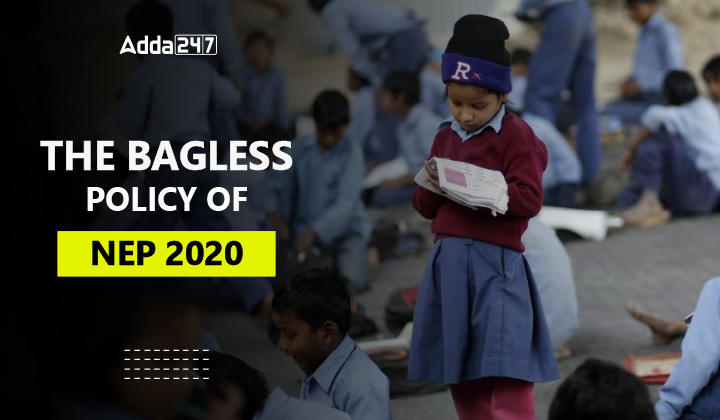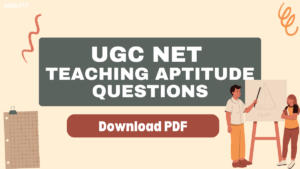Table of Contents
Children and teenagers’ poor posture and backaches have frequently been attributed to heavy school bags. These large school bags have been a challenging topic in all educational circles for years. Therefore, the Indian government addressed this concern in the new National Education Policy. The goal of the Bagless Policy of NEP 2020 is to drastically reduce the amount of weight that kids must carry each day to and from school in their backpacks and textbooks.
UGC NET Study Notes for Paper 1
Bagless Policy of NEP 2020
The National Education Policy (NEP) aims to provide vocational education to a minimum of 50 percent of learners. According to the policy, students will have the opportunity to explore vocational subjects from as early as class 6. Additionally, children in the age group of class 6 to 8 will be actively encouraged to gain practical knowledge and skills related to various vocations through 10 designated “bagless days” activities. These initiatives intend to promote a holistic and skill-based approach to education, fostering students’ all-round development and equipping them with essential vocational competencies from an early age.
Bagless Policy of NEP 2020 – Overview
The Bagless Policy of NEP 2020 emphasizes the importance of programmes like “bagless day,” “vocational courses,” and “vocational crafts” for our kids’ overall development. NEP guarantees everything mentioned below:
- Each student will take part in a 10-day bag-free period sometime between Grades 6 and 8, during which they will intern with local tradespeople like carpenters, gardeners, potters, artists, etc.
- Students in Grades 6 through 12, including during breaks, may be offered comparable internship opportunities to pursue vocational courses.
- Throughout the year, bagless days will be promoted for a variety of enrichment activities including the arts, quizzes, athletics, and vocational crafts.
- On average, teachers and students spend approximately 6 hours a day and over 1,000 hours a year in school.
- The proposed programme suggests allocating a minimum of 10 days or 60 hours of school time to specific activities.
- Schools are encouraged to plan these activities in two parts, with each part consisting of five consecutive days.
The Bagless Policy of NEP 2020 Objectives
The Bagless Policy of NEP 2020 aims at achieving certain goals. A detailed study of those objectives have been enumerated below:
- Enable kids to experience joyful learning.
- Diminish the barriers that currently exist between knowledge that is acquired from books and knowledge that is applied in practical skills.
- Help in bridging the gap between skill-based learning and disciplines found in the general education curriculum, such as science, language, social science, math, etc.
- Give kids a chance to investigate the fundamental abilities needed for the numerous jobs in a workplace.
- Foster the development of soft skills, such as aesthetic values, cooperation, teamwork, use of raw materials, creativity, quality consciousness, etc.
- Integrate work with various academic subjects to learn the various concepts, scientific principles and the basic skills that are closely related to the occupations and career opportunities in the professional world.
The Bagless Policy of NEP 2020 Strategies
In 2018, an emphasis was placed on lowering the weight of school backpacks and instructions had been offered for doing so. The Bagless Policy of NEP 2020, which is in line with the new National Education Policy and adds further impetus to all the NEP recommendations, has been issued by our government as a big boost to prior efforts.
The policy comes with a few strategies for the implementation of the program.
- It advises a class-wise range for the school bag ratio of 10% of the child’s body weight and advocates a routine weight check of school bags.
- It also suggests that the timetable includes a breakdown of which book will be used on which day.
- The Head of School is responsible for ensuring that pupils in Classes I through XII receive an equal daily allocation of textbook weight at the start of the academic term, once the topic timetable for each class has been finalized.
- To save having to carry all of the textbooks every day, it may be encouraged for students to share their textbooks.
Bagless Day Activities
A series of activities had been introduced to inculcate joyful learning during the bagless days. Some of those bagless day activities are:
- Doodling
- Art from waste – doll making
- Dance, drama & mimes
- Kite making & flying
- Visit to solar energy park
- Sitting under the banyan tree
- Expert talk on cyber security
- Educational Tours/Field Visits
- Experiments
- Natural Explorations
- Surveys and case studies
- Interviews involving community/ parents etc.
Bagless Day Benefits for Children
Children have become stress free on the bagless days. Some of the benefits of the Bagless Policy of NEP 2020 are as follows:
- Practical Learning: Bagless Days allow children to engage in hands-on, experiential learning activities that promote practical skills development and real-life problem-solving abilities.
- Holistic Development: These activities focus on nurturing various aspects of a child’s development, including cognitive, emotional, social, and physical skills, fostering a well-rounded personality.
- Creativity and Innovation: Bagless Days encourage creative thinking and innovation as children explore new ideas, projects, and activities that are not always possible in a structured classroom environment.
- Enhanced Curiosity: The diverse range of activities stimulates children’s curiosity, encouraging them to ask questions, explore, and learn beyond textbooks.
- Interdisciplinary Learning: Children get the opportunity to explore subjects and topics that go beyond their regular curriculum, enabling interdisciplinary learning and making connections between various subjects.
- Skill Building: Through activities like arts and crafts, sports, community service, and vocational training, children can develop a wide range of skills, such as teamwork, leadership, communication, and problem-solving.
- Boost in Confidence: Successful participation in different activities during Bagless Days can boost a child’s confidence and self-esteem, encouraging them to take on new challenges in the future.
- Reduced Academic Pressure: Bagless Days provide a break from traditional classroom learning, reducing academic pressure and fostering a positive learning environment.
- Appreciation for Diversity: Participation in varied activities exposes children to diverse interests and talents, promoting tolerance and appreciation for different cultures and perspectives.
- Bonding and Collaboration: Collaborative activities during Bagless Days help students build stronger bonds with peers and teachers, creating a positive and supportive learning community.
- Overall, Bagless Days play a crucial role in creating a well-rounded education, offering children a chance to explore their passions, develop essential life skills, and enjoy a more holistic learning experience.
When was Bagless Day held in school?
The Bagless Day was held for 10 consecutive days. It was an attempt to provide children with a better and far advanced module for learning. This will lead to better performance. Schools were given a choice to select and structure the day as per their wish.
Download UGC NET 2023 Study Notes Paper 1
The direct link to download UGC NET 2023 Study Notes Paper 1 has been given below. Check the Bagless Policy of NEP 2020 PDF through below direct link.




 UGC NET Commerce Syllabus 2025 PDF Downl...
UGC NET Commerce Syllabus 2025 PDF Downl...
 UGC NET Teaching Aptitude Questions Answ...
UGC NET Teaching Aptitude Questions Answ...
 UGC NET Philosophy Syllabus 2025 PDF Dow...
UGC NET Philosophy Syllabus 2025 PDF Dow...




